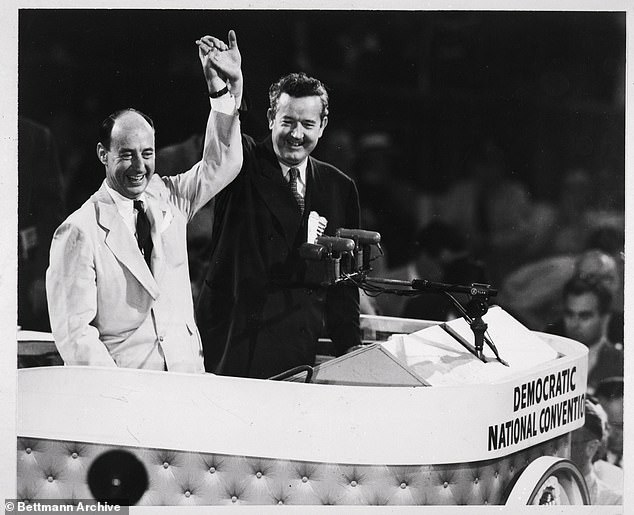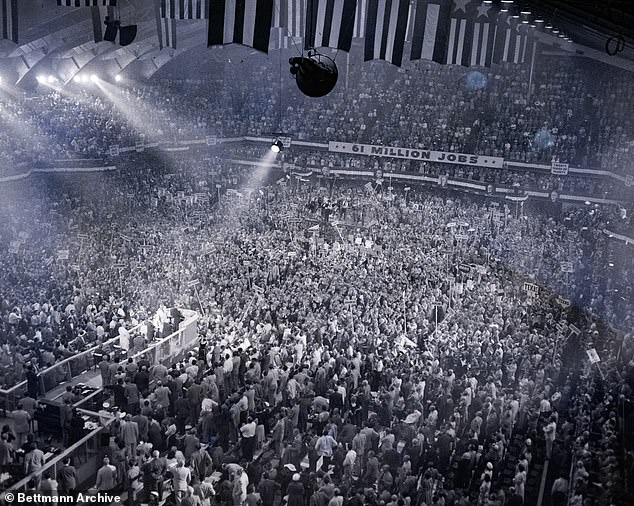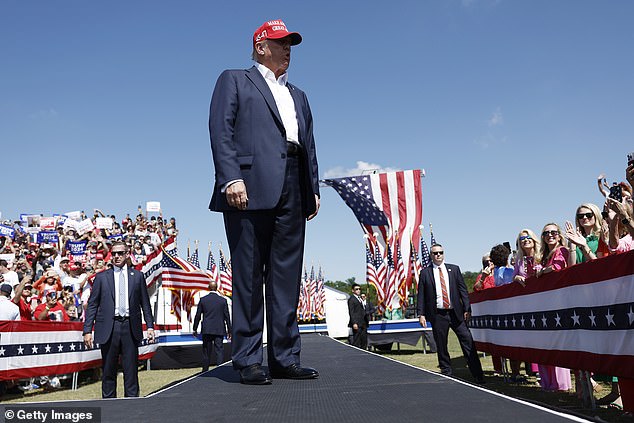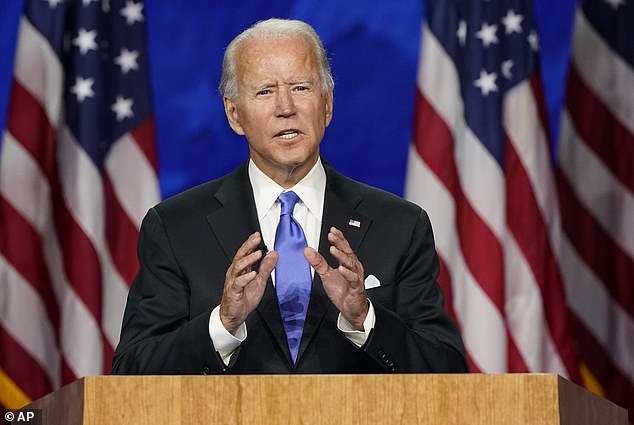President Joe Biden is trying to fight off growing calls within his party for him to drop out of the presidential race, as some Democrats fear he is not up to the job and will not beat Donald Trump.
But if the president decides to withdraw in the coming weeks, there is no clear alternative replacement for the top spot on the ticket, raising the possibility of a negotiated convention for the first time in more than seventy years.
Democrats are headed to Chicago for the Democratic National Convention in August, though due to deadlines to appear on ballots in some states, there will be virtual proceedings to certify Biden as the nominee before in-person programming begins on Aug. 19.
Biden gathered nearly 4,000 pledged delegates to support him as millions of voters cast their ballots for the incumbent president during the primaries.
Biden speaking nearly four years ago on the fourth day of the 2020 Democratic National Convention in Wilmington, Delaware
The Democratic National Committee has emphasized that Biden is currently the only person eligible for the nomination and delegates can either vote for the president or be marked present, according to talking points.
And Biden and the White House reiterated Wednesday that the president has no plans to drop out of the race.
But if he changes course in the coming weeks, it would open the door to a wild and potentially grueling nomination process next month at the convention, with votes continuing until a candidate is chosen by a majority of eligible delegates.
A brokered convention is a presidential nominating convention in which delegates fail to nominate a candidate in the first round. This means that no candidate receives the votes of more than half of the delegates in the first round.
There was a time when brokered conventions were held regularly because the major parties did not hold primaries to allocate delegates as they do today.
This led to a series of complex negotiations between some of the party’s power brokers, typically federal and state leaders, including party officials, legislators and governors.
Voting continues in a round of ballots until one candidate receives a majority of delegates.
The last time there was a negotiated convention was in 1952.

Then-Illinois Governor Adlai Stevenson and Senator John Sparkman at the Democratic National Convention in Chicago in 1952, the last time there was a brokered convention

Stevenson won the Democratic Party nomination in 1952 on the third ballot at the Democratic National Convention in Chicago.
In the end, the Democrats succeeded in nominating Democrat Adlai Stevenson on the third ballot. That year, Republican Dwight D. Eisenhower fell just nine votes short on the first ballot, prompting some delegates to switch their votes to make him the official nominee.
The longest convention ever held was 100 years ago in 1924, when it took Democrats sixteen days and 103 ballots to nominate diplomat John Davis. Franklin Delano Roosevelt needed four ballots to secure the Democratic nomination in 1932.
“We don’t really have any standards or benchmarks or known procedures,” said Leonard Steinhorn, a professor at American University, of what a negotiated convention would look like in 2024. “Right now we’re kind of walking in the wilderness,” he said.
While the terms negotiated convention and contested convention are often used interchangeably, there is a key difference.
A contested convention is one in which one candidate has done well but not well enough to secure the nomination on the first ballot, so another candidate tries to convince delegates to abandon the front-runner.
According to Elaine Kamarck of the Brookings Institute, this has been more common in the modern era than a negotiated convention.
With Biden in the race, the convention is more of a public relations event for the party and the president because the nominee is already determined and, in this current case, is a well-known sitting president.
But if Biden were to drop out of the race before the convention, there would be no clear front-runner unless the president moves to pass the baton and cast a vote of support.
Political parties have largely tried to avoid brokered and contested conventions because history shows that candidates who need multiple votes to be nominated are less likely to win the White House.
It’s an urgent concern as Democrats weigh who is the best candidate to take on Trump this fall.
Of the sixty Democratic and Republican nominating conventions from 1868, after the Civil War, through 1984, eighteen candidates were nominated on multiple ballots, according to Pew.
Of these, only seven were elected president, and among them, four were competing against other candidates who also faced multiple votes to receive the nomination.
The last time a Democrat argued vehemently for an open convention was the late Sen. Ted Kennedy in 1980. The senator challenged President Jimmy Carter for the nomination. Ultimately, delegates had to stand their ground based on their state’s results when voting. But Carter lost the election that fall to Ronald Reagan.
Before that, Republican President Gerald Ford had entered the 1976 convention with a clear majority of delegates, but not enough to secure the nomination, earning him a serious challenge from then-Governor Reagan. He ended up winning the first round, but then lost the election to Carter.
“We want a united party behind the person who appears to be the popular choice of the members of that party, of the voters,” Steinhorn said.
Determining the nominee at the convention would force the party and campaign to go to great lengths to introduce the nominee to the public, raise money and launch a campaign before Election Day.

Donald Trump speaks at a rally in Chesapeake, Virginia, on June 28. Republicans are holding their convention from July 15-18, where the former president will officially become the party’s presidential nominee.
What could benefit Democrats if they face a brokered convention in 2024 is that whoever their nominee is, if not Biden, their opponent will be Trump.
“I“This is going to be an unusual year because Donald Trump has very, very high negative ratings,” Steinhorn said.
While Democrats are reportedly playing catch-up heading into November in their messaging and on-the-ground work, there could be one key difference.
“Given that Donald Trump is so uniquely unpopular as an opposition party candidate, that potentially gives the Democratic Party a slight advantage,” he added.


